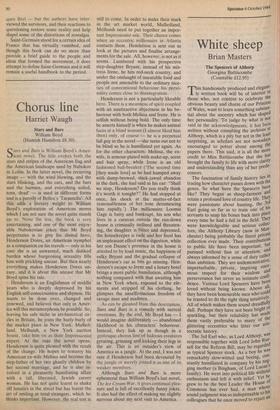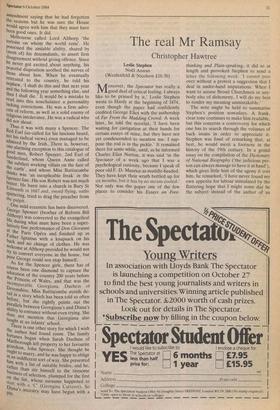White sheep
Brian Masters
The Spencers of Althorp Georgina Battiscombe (Constable £12.95)
rr his handsomely produced and elegant- ly written book will be of interest to those who, not content to celebrate the obvious beauty and charm of our Princess of Wales, want to learn something substan- tial about the ancestry which has shaped her personality. To judge by what is i nut said n the acknowledgments, it has been written without consulting the archives at Althorp, which is a pity but not in the least surprising, as scholars are not nowadays encouraged to potter about among the papers there. This said, it is all the more credit to Miss Battiscombe that she has brought the family to life with more clarity and understanding than any of her prede- cessors.
The fascination of family history lies in tracing how character passes down with the genes. So what have the Spencers bee!! like? They began as sheep-farmers an
° retain a profound love of country life. The were passionate about hunting, the 3r." Earl going so far as to train one of his servants to snap his bones back into place every time he had a fall in the field. They were knowledgeable and serious collec- tors, the Althorp Library (now in Man- chester) being probably the finest priyate collection ever made. Their contributions to public life have been important, btil pursued without fuss or attention, an always informed by a sense of duty rather than ambition. They are undemonstrative, imperturbable, private, inspiring en°11-, mous respect for their wisdom an" perseverance but never an intimate confi- dence. Various Lord Spencers have been loved without being known. Above all, they have been honourable men who could be trusted to do the right thing intuitively. All of which makes them sound dreadfullY dull. Perhaps they have not been bright or sparkling, but their reliability has made them vastly preferable to many of the glittering eccentrics who litter our aris- tocratic history. The 3rd Earl who, as Lord Althorp, Was responsible together with Lord John ROA- sell for the Reform Bill, may be regardeu as typical Spencer stock. As a boy he was remarkably slow-witted and boring, con- stantly humiliated in company by his naS- ging mother (a Bingham, of Lord Lucan s family). He went into political life without enthusiasm and left it with relief. Yet hef grew to be the best Leader the House Commons has ever had, a man whose sound judgment was so indispensable to lus colleagues that he once moved to reject an
amendment saying that he had forgotten the reasons but he was sure the House would agree with him that they must have been good ones. It did. Melbourne called Lord Althorp 'the tortoise on whom the world rests'. He possessed the amiable ability, shared by (roost of) his descendants, to assert firm disagreement without giving offence. Since he never got excited about anything, his peaceful disposition soothed the nerves of those about him. When he eventually retreated to the country, he told his nephew, 'I shall do this and that next year and the following year something else, and then I shall die.' It would be a mistake to read into this nonchalance a personality lacking convictions. He was a firm advo- cate of reform, as well as a solid enemy of religious intolerance. He was a radical who did not shout. Thus it was with many a Spencer. The Red Earl (so-called for his luscious beard, not his radical views) even managed to be admired by the Irish. There is, however,
one alarming exception to this catalogue of good men, Robert Spencer, 2nd Earl of Sunderland, whom Queen Anne called the subtlest working villain on the face of the earth', and whom Miss Battiscombe thinks was 'an inexplicable freak' in the Spencer line. His son Robert was not much better. He burst into a church in Bury St Edmunds in 1687 and, sword flying, oaths spattering, tried to drag the preacher from the pulpit. One mild eccentric has been discovered. . George Spencer (brother of Reform Bill A.1thorp) was converted to the evangelical life during what must have been a super- latively fine performance of Don Giovanni at the Paris Opera and finished up as rather Ignatius with a knapsack on his 3ack and no change of clothes. He was welcome at Althorp provided he would not try to convert everyone in the house, but Poor George could not stop himself. As for the Spencer girls, there has of course been one diamond to capture the adoration of the country 200 years before the Princess of Wales, and that was the incomparable Georgiana, Duchess of Dev.onshire. Miss Battiscombe avoids de- tail in a story which has been told so often before, but she rightly points out the Parallels between Georgiana's and Diana's ability to entrance without even trying. She does not mention that Georgiana also taught at an infants' school. There is one other story for which I wish the author had found room. The family fortunes began when Sarah Duchess of Marlborough left property to her favourite grandson, John Spencer. She thought he Oughtto marry, and he was happy to oblige In. an indifferent sort of way. She presented him with a list of suitable brides, and he, rather than stir himself to the tiresome business of selection, plumped for the first On the list, whose surname happened to start with a *C" (Georgina Cartaret). So
Oiana's ancestry may have begun with a Pm.















































 Previous page
Previous page